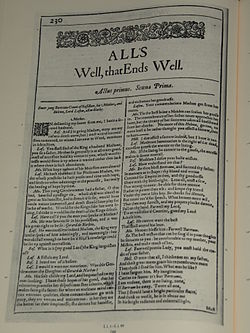I know how I had griped about how I hated Shakeapeare’s play, “All’s well that ends well”, as it has very less value and is male chauvinistic as far as Bertram, the hero is concerned. But I decided to watch the University of Michigan’s Musical theater Department’s version again as many critics say that for this particularly complex play, the interpretation (and of course, the acting) is what makes or breaks the play.
Set in the nice spacious and quaint Arthur Miller Theatre, the cast and crew changed the time period from the 1600s to a more modern setting in the 1950s and somehow, Helena spouting dialogues from the 1600s in a black evening gown instead of in a Elizabethan Costume somehow didn’t seem out of place at all. The set was very minimalistic and it was all ok for the low-cost production which thus paved way for the actors to show off their skills.
The first half started off nicely but the pace was kind of slow with only a few moments of brilliance- Parolles’ monologue on virginity(“To speak on the part of virginity is to accuse your mothers, which is most infallible disobedience”), the scene with the boring King and his even more bored counts and the banter between the Countess of Rousillon and Lavatch, a fool in her pay. When I stepped out for intermission, there was a long line for the free show at the Basement Arts and I felt that I could have gone there instead. But I prevailed and the second half was not so bad.
The pace picked up and there were lots of interesting happenings- the soldiers having fun at Parolles’ expense and the scene where a head-over-heels-in-love Bertram woos Diana, the “bed trick” and the building up of events for the climax. The beautiful actress who played Helena (Laura Reed, a sophomore) did a remarkable job. Lavatch the fool was brilliant as well.
- Laura Reed as Helena
Then the end came and well, this wasn’t as great. When the young, chocolate boy faced Bertram (played by Tyler Jones who was very convincing as a naive dandy till then) promises to be a faithful husband to Helena and “love her dearly, ever, ever dearly, you are like “What, how did that happen now?”.
In “All’s well that ends well”, Bertram can be intrepreted as a man who truly falls in love with his wife or as a man who matures into a more responsible person. In this version, it felt like a man who was more resigned to his fate. I didn’t quite like the way it ended and no offense to the actors, the end could have done better.
But I won’t blame it on the actors as then again, “All’s well that ends well” was not a very popular play even in the Bard of Avon’s days. The play lacks finality unlike the other plays and you don’t find the spectacular twists as in other plays of Shakespeare. Is it a comedy or a tragedy? Marriage is described as a contract and there is no clarity in the purpose of the play. It is a tough play to choose and the actors’ efforts were definitely commendable.
I had seen “All’s well that ends well” performed by London’s NAtional Theatre and broadcast telecast live at the Michigan Theater in partnership with UMS as part of the “National theatre Live” series. In that version, the actress who played Helena was flawless and Parolles stole the show with his bravado and superb comic timing. As for Bertram, he was a superb actor and when he delivered that last lone line, it was not so bad.
Overall, in the university of michigan musical theater department’s version, there was a continuity in the play and the transitions were smoothly done. The sound and stage effects were good too. This was a brave attempt and one well done.
For [art]seen,
Krithika





